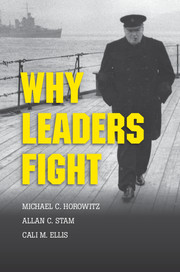Book contents
- Frontmatter
- Contents
- List of Figures
- List of Photographs
- List of Tables
- Preface
- Introduction
- 1 How Leaders Matter
- 2 Systematically Evaluating Leader Risk
- 3 Leader Risk across Geography and Time
- 4 The Experiences That Matter I: Military/Rebel Status, Age, and Education
- 5 The Experiences That Matter II: Childhood, Family, and Gender
- 6 “L’état, c'est moi” – or Is It?
- Bibliography
- Index
1 - How Leaders Matter
Published online by Cambridge University Press: 05 October 2015
- Frontmatter
- Contents
- List of Figures
- List of Photographs
- List of Tables
- Preface
- Introduction
- 1 How Leaders Matter
- 2 Systematically Evaluating Leader Risk
- 3 Leader Risk across Geography and Time
- 4 The Experiences That Matter I: Military/Rebel Status, Age, and Education
- 5 The Experiences That Matter II: Childhood, Family, and Gender
- 6 “L’état, c'est moi” – or Is It?
- Bibliography
- Index
Summary
Introduction
Explaining the importance of studying leaders in an international relations context requires returning to a topic briefly mentioned previously, the treatment of leaders in existing international relations research. Current scholarship generally understates the importance of leadership in determining countries’ foreign policy goals and strategies. While political scientists generally recognize that leaders can and do shape a state's foreign policy, they have also been deeply skeptical that there is anything systematic in the ways we can understand leaders’ personal preferences in world politics. For the past sixty years, these scholars have focused on the ways in which political institutions and the distribution of power within the international system shape states’ choices, and in so doing, they have largely ignored leaders. At the same time, the general trend among historians has been to focus less on political leaders and diplomatic history and more on social movements and previously underrepresented groups within societies. While the shift in academic focus away from leaders was originally a reaction to psychoanalytic arguments that lacked nuanced data, it has led many to ignore numerous studies of individual leaders’ policy preferences and the psychological foundations of those beliefs. The turn to social history has therefore come at a cost: an entire generation of academics and students has little appreciation of the ways – both idiosyncratic and systematic – leaders shape the world in which we live.
Research on Leaders Within International Relations: False Revival?
A renaissance in the study of leaders in political science, and especially international politics, seems under way. However, the growth in research on leaders that has occurred over the last several years has largely taken place in the confines of the dominant paradigms described previously. Nearly all current research on leaders and international conflict focuses on the ways domestic institutional arrangements shape and constrain the choices of leaders rather than demonstrating how variation in leaders’ individual attributes affects state behavior. According to much current scholarship, the person who resides in an office, whether Barack Obama, Joseph Stalin, or Neville Chamberlain, is largely irrelevant. What matters most are the institutional constraints influencing the probability that the leader will survive a given situation and the ways those odds shape the willingness of the leader to support or oppose particular policies.
- Type
- Chapter
- Information
- Why Leaders Fight , pp. 25 - 57Publisher: Cambridge University PressPrint publication year: 2015
- 1
- Cited by

